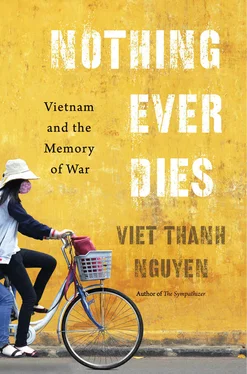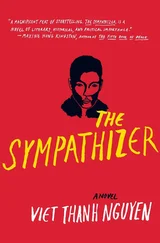thuy’s book, like much of the writing, art, and politics dealing with the war, focuses on the problem of mourning the dead, remembering the missing, and considering the place of the survivors. This problem is endemic to refugees, for whom separation from family and homeland is a universal experience. Common among refugees are memories and stories of the dead, the missing, and the ones left behind, those relatives, friends, and countrymen facing the consequences escaped by the refugee. In some cases, the refugee may even benefit from telling about those consequences and the ghosts of their past. Remembering becomes imbued with the dead, freighted with their weight, a risky and burdened act. As Nguyen-Vo Thu-Huong says, “how shall we remember rather than just appropriate the dead for our own agendas, precluding what the dead can tell us?” 4In a parallel case, Maxine Hong Kingston captures the ethical challenge for writers who speak about terrible events when she opens The Woman Warrior with her mother telling her, “You must not tell anyone what I am about to tell you,” a command broken in the very act of repeating it. 5The writer and the witness face the ethical demand to speak of things that others would rather not speak of, or hear about, or pass on into memory, even if in doing so they may perpetuate the haunting rather than quell it. Reflecting upon an anonymous aunt whose suicide was the consequence of family neglect and neighborly abuse, Kingston says, “I do not think she always means me well. I am telling on her, and she was a spite suicide, drowning herself in the drinking water. The Chinese are always very frightened of the drowned one, whose weeping ghost, wet hair hanging and skin bloated, waits silently by the water to pull down a substitute.” 6As do all writers who speak of ghosts, Kingston inhabits the fraught territory of the substitute.
For Southeast Asians who lived through the war, ghost stories were easy to come by, as memoirist Le Ly Hayslip recounts:
We found ourselves praying more often, trying to calm the outraged spirits of all the slain people around us.… Slain soldiers used to parade around the cemetery too, but whenever we kids got close, they evaporated into the mist. At night, my family would sit around and the fire and tell stories about the dead.… Consequently I began to think of the supernatural — of the spirit world and the habits of ghosts — the way others might think of life in distant cities or in exotic lands across the sea. In this discovery, I would later find I was not alone. 7
The appearance of ghosts like these becomes a matter of justice, according to the sociologist Avery Gordon. Their haunting demands that “we be accountable to people who seemingly have not counted in the historical and public record.” 8This demand weighs heavily on those investigating the war’s aftermath, like Gordon’s fellow sociologist, Yen Le Espiritu, who declares that we must “become tellers of ghost stories.” 9But speaking of ghosts is a dangerous act, for the storyteller must confront these ghosts, or exploit them, or return to the fatal circumstances that made them. In doing so, the storyteller must take responsibility for her tale when she invokes the dead, instead of merely claiming artistic license.
The ethical considerations for storytellers who speak of the dead and ghosts are particularly burdensome for minorities, those smaller in numbers or power. Thinking of themselves as weak or weaker, minorities may also be tempted to see themselves as victims, explicitly or implicitly. The majority may view the minority or the other as a victim, too, for that keeps the minority and the other in their places, their role to suffer and then to be saved by the powerful majority. Being a victim is a masked power that compels guilt on the part of the rescuer or the one who feels pity, but it is also a trick played on the victim for the victim’s supposed benefit. To see oneself only as a victim simplifies power and excuses the victim from the obligations of ethical behavior in politics, warfare, love, and art. Being a victim also forecloses the chance to wield real power, which the majority is not inclined to grant the minority and the other, offering them instead victimization and voice, two doors into the same trap. Ethics forces us to examine the power that we wield and the harm we ourselves can do, the dilemma that when one acts or speaks, even in the service of ghosts, one can be victimizer and victim, guilty and innocent.
Writers, artists, and critics can inflict various kinds of harm with the symbolic power they wield; so can minorities and their advocates do damage. Harm is a consequence of holding power, and even minorities and artists have some measure of power. Raising the issue of how a minority can inflict harm acknowledges that a minority is a human and inhuman agent, not merely a powerless victim, a passive subject in history, or a romanticized hero. Thinking of minorities as being human and inhuman complicates the usual stances of a patronizing, guilt-ridden majority as well as many advocates for minorities, both of which prefer to see the minority as human. So it is that when advocates for minorities speak of them taking up power, they often mean power being used as resistance against abusive power, an act with greatly reduced moral and ethical complication. The possibility of the minority possessing power with all of its confusing and contradictory implications, including the negative and the damaging, may be forgotten or overlooked in the temptation to see the minority as the victim of abusive power. While a minority’s power is not equal to the majority’s power, the minority must claim responsibility for the power it does possess, the power it must have if it can resist and, ultimately, liberate itself. In the recent past, the Western Left, so keen on the cry for resistance and liberation, has had the luxury of not actually accomplishing revolution and therefore suspending the confrontation with what it means for the wretched of the Earth to have power. Thus, if there is one thing that the revolutions in Indochina can teach the West, it is that resistance and liberation have unforeseen consequences. Those who have been damaged can, when they come into power, damage others and make ghosts.
Vietnamese Americans offer a paradigmatic example of the problems of telling on and about ghosts. Of all the Southeast Asians in America, they have written the most literature and have the longest literary tradition. French colonial policies encouraged this tradition, with the French favoring the Vietnamese over Cambodians and Laotians for the colonial bureaucracy, a practice that inevitably cultivated a literary class. The Vietnamese also benefitted from a more intense extraction of their frightened population at the end of the war, vastly outnumbering Cambodian and Laotian refugees. Both in terms of the superiority of numbers and literary education, the Vietnamese in America are a politically engineered demographic who possess much greater cultural capital than Cambodian and Laotian refugees. Their literary output can and should be judged, then, by the highest standards of ethics, politics, and aesthetics, for they have had some advantages to balance their war-born disadvantages. Thus their literature serves as an ideal test case for how the use of victimization and voice has come to dominate the aesthetics of minority literature in America. By aesthetics, I mean the process by which beauty is created and studied, which, in the case of victimization and voice, is difficult to separate from the issue of ethical responsibility. In the realm of ethnic storytelling, the ethical and aesthetic reluctance to confront one’s power is manifested through not telling on one’s own side while reporting on the crimes of others and the crimes done to one’s own people. But only through telling on how one’s own side has made ghosts can one stop being a victim and assume the full weight of humanity, which includes the burden of inhumanity.
Читать дальше












